

Gardeners and pest controllers say wasps, important predators and pollinators, appear to be in sharp decline.
The UK is failing to adequately monitor its wasp populations, despite increasing concerns from gardeners and pest controllers that these crucial insects are in sharp decline. Wasps, vital predators, and pollinators, are reportedly experiencing a significant drop in numbers this year, yet the country lacks a dedicated national monitoring programme to track this worrying trend, according to a leading entomologist.
Dr Gavin Broad, Principal Curator of Wasps at the Natural History Museum, has raised the alarm over the UK’s insufficient efforts to track wasp populations. Unlike other invertebrates, such as bees and butterflies, which benefit from established national monitoring schemes, wasps are overlooked. Dr Broad expressed concern over this knowledge gap, warning that it hinders our ability to understand the long-term trends affecting these important insects. “We don’t know much about the populations of wasps,” he said. “The common wasp [Vespula vulgaris] and German wasp [Vespula germanica] seem to have cycles of abundance and decline, likely influenced by weather conditions, but there is no systematic recording of their numbers.” This year, wasp populations appear to have been particularly hard-hit, with colder and wetter weather likely playing a significant role in their decline. Reports from gardeners, pest controllers, and experts indicate a noticeable reduction in wasp sightings, sparking concerns that these insects may be in serious trouble. The lack of comprehensive data means that scientists cannot accurately assess the full impact of these environmental changes on wasps, leaving a critical gap in our understanding of their population dynamics.
The UK Centre for Ecology and Hydrology operates a pollinator monitoring scheme, but Dr Broad noted that this programme primarily focuses on bees and hoverflies, leaving wasps largely unaccounted for. This oversight is troubling, especially given the anecdotal evidence suggesting that some wasp species may be experiencing long-term declines. Conversely, other species, such as the hornet (Vespa crabro), appear to be thriving. “Wasps sit at the top of the insect food chain,” Dr Broad explained, “so the health of their populations could tell us a lot about the general state of insect populations.” Without proper monitoring, however, this valuable information remains out of reach. The decline in wasp populations is particularly concerning given the broader context of climate change and its impact on the UK’s wildlife. The Met Office has predicted that climate breakdown will bring more extreme weather conditions to the UK, including heavier rainfall, more frequent downpours, and disrupted seasonal patterns. These changes are likely to have a significant impact on species like wasps, which build their nests in the ground and are, therefore, highly vulnerable to flooding and other environmental disruptions.
The Royal Horticultural Society (RHS) has reported a surge in enquiries from its members, who have noticed the absence of wasps in their gardens throughout the summer. The horticulture charity has previously highlighted the importance of wasps as beneficial garden insects, noting their role as vital predators that feed on common garden pests such as caterpillars and greenfly. Wasps also play an essential role as pollinators, contributing to the health and productivity of gardens and ecosystems alike. This apparent decline in wasp populations is part of a broader and more alarming trend affecting pollinators across the UK. Government data surveying nearly 400 species of bees and hoverflies has revealed that 42% have become less widespread in the UK since 1980. This decline is attributed to several factors, including the widespread use of pesticides, the loss of food plants and habitats due to intensive farming and urban development, and the increasing impact of climate change.
The failure to monitor wasp populations effectively not only jeopardizes our understanding of these specific insects but also risks leaving us in the dark about the health of the wider ecosystem. Wasps play a crucial role in controlling pest populations and supporting pollination, and their decline could have far-reaching consequences for biodiversity and food security. As climate change continues to alter the natural world, the need for comprehensive and systematic monitoring of all pollinator species, including wasps, becomes ever more urgent. In light of these concerns, experts are calling for the establishment of a national monitoring programme for wasps, similar to those already in place for bees and butterflies. Such a programme would help to fill the current gaps in knowledge, providing valuable data on wasp population trends and enabling scientists to take timely action to protect these essential insects. Without such measures, the UK risks losing not only its wasps but also the critical ecological services they provide.
Aiman Aziz
https://www.theguardian.com/environment/article/2024/aug/07/uk-failing-to-monitor-apparently-falling-wasp-populations-expert-warns
https://www.bbc.com/news/articles/c147v82gxp2o
https://ca.news.yahoo.com/citizen-scientists-called-monitor-uk-205521843.html
